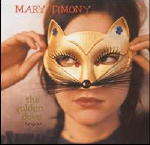|
|
 |
Dusted Reviews
Artist: Mary Timony Album: The Golden Dove Label: Matador Review date: Jun. 4, 2002 |

|
|
|
 |
This review was supposed to have been concise, but has transformed into my usual hodge-podge of half-baked musings, excessive parentheses, and long fragmented sentences that resemble the work of a chimp with a supernaturally enhanced vocabulary. Read with sympathy if for some inexplicable reason you are compelled to know what I think about Helium mastermind Mary Timony’s newest album of Medieval-inflected enchanted balladry.
I think it’s pretty good.
With the last Helium disc (The Magic City) and her solo debut, Mountains, Mary Timony distinguished herself as the past decade’s leading practitioner of gnome rock (A definition: A band is likely gnome rock if they write songs about gnomes, fairies, dragons or other magical beings. Not so much a genre determined by musical content as it is a style of song writing, gnome rock is popular with some psychedelic and prog bands. If the band you’re listening to is singing about a tiny gnome living in a tiny house or about little elves with matching little hats, then they’re definitely gnome rock.) Mountains took the fairy-tale aspect of her music past the point where most casual listeners could tolerate it; the newest offering of “Ms. Charming Melodee” (as she’s credited in the liner notes – Timony seems to be starting to have fun with her odd Renaissance-Fest schtick), The Golden Dove, continues in the same vein, but scales back the story-book whimsy and apocalyptic witch-woman musings. It’s closer to the Magic City in style, grafting Timony’s neurotic and idiosyncratic view of our world (the one without magical transformations and bewitching familiars) with her fantasy leanings, and shares some of the same obsessions: faltering or failed relationships, death, escape in its myriad forms, California (the Golden State appeared prominently on The Magic City in “Leon’s Space Song” - on The Golden Dove it is assigned near-totemic significance – the bird of the album title is a changeling boy who fled to California, and one song pays tribute to the Doors).
Aside from California, Timony’s been singing about these topics since the first Helium EP, but her method of addressing them has transformed. All of her records obsess over gender and sex and mortality. Helium’s The Pirate Prude and The Dirt of Luck cloaked these topics in claustrophobic horror movie imagery and Timony’s strange crypto-feminist earth mother/whore mythology. The lyrics were simultaneously laced with self-loathing and self-celebration, the music recalled Sonic Youth on Quaaludes. It was the sound of a young woman’s head collapsing. With No Guitars and The Magic City, Helium’s sound and Timony’s lyrical outlook lightened considerably. Her personal mythology became crowded with fantastical creatures – ghosts, witches, dragons. A preoccupation with transcendence and magical possibilities entered her song writing, and remains at its core. Timony still sings about dying and other grim topics, but apologetically, as if her previous overly-depressing records have taken a toll on her. On The Golden Dove’s “The Mirror” and “The White Room” she is distressed with her morbidity, and portrays it as a barrier between her and those she loves. Although she still gets shot and is thrown into the ocean at the end of “The Mirror”, she rues the “songs of death” that drive those she wishes closer farther away. In “The White Room” she fears a “poison melody” (evidently hers) that may enter her brain, killing her and her mind. Her earlier albums found her bragging of possessing the strength of a monster – now she’s frightened of her own power. The Golden Dove finds Mary Timony struggling to be positive, although her spooky fairy tale music at first might not seem like the ideal vehicle for personal affirmation.
Fittingly, the songs on The Golden Dove are divided between ghostly piano-dominated dirges and upbeat tracks that demonstrate the skill with pop hooks that Timony possessed early on - even when her music, sludgy and pained, barely had room for them. The tension between the different aspects of her personality that pervade Timony’s music is much of what makes it interesting; on The Golden Dove it has taken a subtler and more magick-oriented form. It’s inevitable that many ears might have difficulty getting past the album’s fantasy trappings, but they’re part of Timony’s struggle, a sweet delirium echoing rock music’s earliest and most compelling message, its unremitting siren song – I Want To Be Free.
By Mark Hamilton
|







